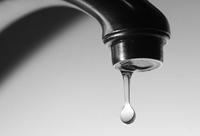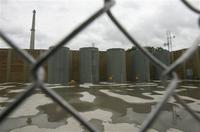-
Study finds natural gas releases twice as much greenhouse gas as coal
A new study shows that natural gas is not as environmentally friendly as previously thought, dealing a major blow to environmentalists who viewed it as a “bridge fuel” to cleaner energy alternatives; researchers found that the greenhouse-gas footprint of shale gas over a twenty year period was at least 20 percent higher than coal and could even be “more than twice as great”; the study was quick to draw criticism from oil and gas companies for its use of shoddy data; the study also outlines multiple ways that the oil and gas companies could reduce methane emissions by up to 90 percent during the drilling process
-
-
West Texas towns face impending water shortage
West Texas is facing a dire drought that has local officials scrambling to find additional sources of water for thirsty residents; since last October, West Texas has only seen about one-tenth of an inch of rain, and now two of the three reservoirs that cities in the Permian Basin depend upon are nearly empty; the third reservoir is 30 percent below capacity; without significant rain soon, all three reservoirs will be dry by January 2013; residents have been restricted to only three days of outdoor watering; the region faces limited options for additional sources of water and plans will be expensive to implement
-
-
California school building regulators had ties with anti-regulation lobby group
A California watchdog group recently revealed that state officials in charge of enforcing earthquake standards for school buildings have had a long and questionable relationship with a lobbying group that actively works to oppose building safety regulations in public schools; senior officials with the Division of the State Architect had been dues paying members of the Coalition for Adequate School Housing, which actively lobbies for less regulation on school construction; in 1997, state regulators were told that taxpayers would reimburse their membership dues to be a part of the lobbying group; officials maintain that there has been no corruption; in 2010 a major regulatory provision in place since 1933 was removed
-
-
Fears over nuclear energy stall Kentucky nuclear plans
Days before the 11 March earthquake and tsunami struck Japan causing its ongoing nuclear crisis, a bill that would have eased restrictions on the construction of a nuclear power plant in Kentucky failed to pass the state legislature dashing the hopes of atomic energy advocates; the proposed site currently houses a uranium enrichment facility, but it is expected to be shut down in the near future leaving 1,200 people out of work; safety advocates are concerned because the site is located near the New Madrid seismic zone; Kentucky generates 90 percent of its power from coal, and Governor Beshear proposed in 2008 to use nuclear power to generate 30 percent of the state’s energy by 2030
-
-
Intrusion detection company joins chemical society
The growing attention to chemical plants safety leads perimeter security companies to show even more interest in that sector; Senstar, a manufacturer of perimeter intrusion detection technology, joins the Society of Chemical Manufacturers and Affiliates
-
-
New guide explains perimeter protection options
A new guide explains the subject of perimeter protection clearly and concisely to enable specifiers, facilities managers, security managers, and consultants to identify the optimum security measures for particular premises and threats; it covers not only high-security fencing, barriers, and gates, but also electric pulse systems and associated security measures such as access controls, CCTV, and intrusion detection systems
-
-
U.K. struggles to reduce water usage as supplies dwindle

An uncharacteristically warm and dry spring in the United Kingdom has forced water companies to begin conserving water, but a recent survey indicates that the method currently employed is widely unpopular and grossly affects low income families; some reservoirs are 20 percent below normal levels and eleven rivers are at their lowest in twenty years; in 1989 the British government mandated that all new homes have water meters installed and introduced a usage plan which charges households based on the amount of water they consume; the plan has proven effective in reducing water usage, but costs have increased by more than 50 percent
-
-
Iran's control systems attacked by another virus

Iran admitted it has been attacked by another virus aiming to disrupt its industrial control systems; the commander of Iran civil defense said, though, that the virus has been caught in time and neutralized by Iran’s “young experts”; Gholamreza Jalali described the virus as “congruous and harmonious with the (computer) system and in the initial phase it does minor damage and might be mistaken for some executive files of government organizations”; in the summer, nearly 42,000 computers and servers in Iran’s industrial control systems — many of them in Iran’s nuclear weapons program — were infected; the damage to uranium enrichment centrifuges was especially great, causing Iran in mid-November to halt enrichment operations; Stuxnet has also infected the Bushehr nuclear reactor; the reactor was supposed to come on line in August, but it is still not operational, and has missed several start-up deadlines
-
-
PG&E send safety information to customers living near gas pipelines
PG&E begins notifying customers of gas transmission pipeline locations and highlights actions the company is taking to make natural gas transmission lines safer; the letter safety brochures is being to 2.5 million homeowners and businesses located within about 2,000 feet of a natural gas transmission pipeline
-
-
Recycled concrete saves money
Purdue University civil engineers are working with the Indiana Department of Transportation to perfect the use of recycled concrete for highway construction, a strategy that could reduce material costs by as much as 20 percent; “If you are going to pave, you may have to remove the old concrete and break it into pieces anyway, so recycling makes sense,” one of the researchers says
-
-
Opposition to nuclear power grows in India

Opponents of nuclear power in India have received a major boost following the continuing nuclear crisis in Japan; the Indian government has planned an aggressive push to develop thirty-nine new nuclear power plants; by 2050, the government hopes to generate 25 percent of the country’s electricity with nuclear power; as a result of the events at Japan’s Fukushima Daiichi nuclear plant, Indian scientists, politicians, and residents have become increasingly opposed to the construction of new nuclear plants; critics cite safety concerns and cleaner alternatives as reasons for their opposition; India faces a real need for power, approximately 40 percent of the country is not connected to the electrical grid and most major cities do not have reliable power twenty-four hours a day
-
-
Wyoming braces for spring floods
The Wyoming Office of Homeland Security is readying local and state agencies for projected spring floods and is urging local residents to prepare themselves as well; this year large snow packs from heavy winter storms have increased the likelihood of flooding; state officials are encouraging families to keep a three-day emergency kit loaded with food, water, clothing, flashlights, medicine, and important documents; last year floods hit Wyoming causing major disruptions, particularly in Fremont County; this year state officials hope to minimize the impact of floods with early preparation
-
-
Cooling pools or dry casks for nuclear waste: which is safer

There are two ways to store nuclear waste: in pools of water, where the densely packed uranium rods are cooled by a constant flow of circulating water, or in dry casks — typically barrel-shaped steel-and-concrete structures that stand twenty feet high and sit outdoors — where the uranium loosely packed rods are cooled by passive air; there are 65,000 tons of nuclear waste in the United States, more than in any other nation, and this amount grows by about 2,200 tons each year; the Fukushima disaster demonstrated that dry casks were able to withstand the 11 March combination of earthquake and tsunami much better than cooling pools; the U.S. Nuclear Regulatory Commission must now decide whether cooling pools are safe enough to store nuclear waste, and even whether densely packing nuclear waste is safe
-
-
Chernobyl radiation did not damage abundance, diversity of aquatic life
A new study of the lakes in and around Chernobyl’s fallout zone reveals that radiation from the nuclear accident appears to have had no long term effect on the abundance or diversity of aquatic animal life; no evidence was found that the abundance or diversity of the animal communities was influenced by direct contamination from the Chernobyl accident; indeed, the most contaminated lake, Glubokoye, 6.5 km north of the nuclear power plant, supported the most animal diversity of those lakes studied
-
-
Dramatic increase in critical infrastructure cyber attacks, sabotage
A new study by McAfee and CSIS reveals a dramatic increase in cyber attacks on critical infrastructure such as power grids, oil, gas, and water; the study also shows that that many of the world’s critical infrastructures lacked protection of their computer networks, and revealed the staggering cost and impact of cyberattacks on these networks
-
More headlines
The long view
Falling Space Debris: How High Is the Risk I'll Get Hit?
An International Space Station battery fell back to Earth and, luckily, splashed down harmlessly in the Atlantic. Should we have worried? Space debris reenters our atmosphere every week.
Using Drone Swarms to Fight Forest Fires
Forest fires are becoming increasingly catastrophic across the world, accelerated by climate change. Researchers are using multiple swarms of drones to tackle natural disasters like forest fires.
Strengthening the Grid’s ‘Backbone’ with Hydropower
Argonne-led studies investigate how hydropower could help add more clean energy to the grid, how it generates value as grids add more renewable energy, and how liner technology can improve hydropower efficiency.
LNG Exports Have Had No Impact on Domestic Energy Costs: Analysis
U.S. liquified natural gas (LNG) exports have not had any sustained and significant direct impact on U.S. natural gas prices and have, in fact, spurred production and productivity gains, which contribute to downward pressure on domestic prices.
